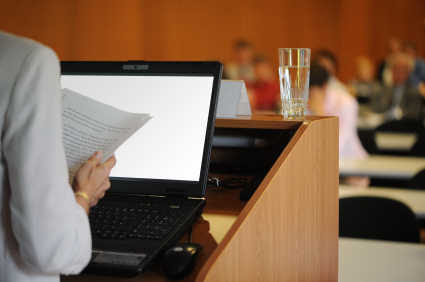Should I Tell The Audience That I’m Nervous?
Most people get nervous when they deliver a presentation. As Mark Twain famously said, “There are two types of speakers: those who get nervous and those who are liars.”
Still, most public speaking experts advise presenters to never admit to an audience that they’re nervous. Here’s a sampling of advice:
In his excellent book Presentation Zen, Garr Reynolds writes that a “confession that you are nervous may seem honest and transparent, but it is too self-focused at a time when you are supposed to be focused on the audience and their needs and feelings.”
Dorothy Leeds, the author of Power Speak, writes something similar: “You don’t have to reveal your nervousness; you can keep it to yourself. You gain nothing by letting others know you’re worried.”
A Toastmasters article called “10 Tips for Public Speaking” dispenses the same advice: “Don’t apologize for any nervousness or problem—the audience probably never noticed it..”
The advice to not admit nervousness also often suggests that by mentioning your nervousness, you’re giving the audience a reason to look for it. And if they look for it, the argument goes, they’re likely to find it. Worse, while they’re looking for it, they won’t be paying attention to very much of what you’re saying.
Annette Simmons, the author of The Story Factor, disagrees with that line of thinking:
“If you get nervous…the best strategy is to admit it. If you say something, like “I’m nervous” or a humorous “Is it hot in here to you?” the admission releases your mind from the work of pretending to be something you are not.”
Who’s right?
I generally agree that it’s best not to disclose your nervousness to the audience. While it might comfort you to acknowledge your anxiety, doing so doesn’t help the audience understand and act upon the main point(s) of your speech any better—which, after all, is the primary goal of most presentations.
Plus, your goal is to present yourself as a confident and competent speaker. An admission of nervousness can undercut that perception—which may be completely unnecessary, since the audience may not have otherwise even known that you were nervous (here are seven ways to reduce your fear of public speaking).
But I do think the advice is often over-stated. The declarative sentences and the “never admit nervousness!” tone is probably hyperbolic. Yes, it’s a good idea to avoid such admissions, but no, it’s probably not going to have a devastating impact on your speech if you do it anyway (assuming, of course, you do most of the big things right).
As to Ms. Simmons’ point, I agree with her in more limited circumstances. When a powerful person admits nervousness before an audience of lower status—a president speaking to college students, for example—an admission of anxiety can come across as charming. That might be conveyed through a genuine admission of nervousness or a device intended to express humility (“I have to admit that I’m nervous to speak before such a fine group of scholars. As you might remember, my college grades weren’t exactly stellar.”)
[poll id=”33″]





I would add that all of the disclaimers at the beginning of a speech have become incredibly cliche, and in any instance make you appear amateurish. During a toast at a wedding I attended last weekend, the best man began by saying, “This is going to be short, because I hate speaking in public.” I can’t tell you how many business presentations I attend where the speaker says something akin to, “Please bear with me, because I’m not used to speaking in front of an audience.” And, of course, there are the endless, “I apologize if my voice is a little scratchy–I’m just getting over a cold.” What all of these admissions are really telling the audience is, “If this presentation sucks, it’s not my fault.” I think that if you’re going to give a speech–even if you are pressed into it–you’ve got to go into it as if you’ve been born to it. We’re there to listen to you talk. Our time is valuable. Implying that you’re going to be boring or otherwise disappointing is the wrong message to relay. Now maybe you might bore us and disappoint us–that’s another topic. But there’s no reason to set yourself up for failure right at the outset.
I’ve done a lot of public speaking over my career. Rather than call attention to nervousness, I take a deep breath, smile and channel the energy into the presentation. Once you get started, the nervousness dissipates and you are on a roll. Don’t hold papers — it may call attention to trembling hands; but then, your notes are always best laid out (with two pages showing) on the lectern so you can “turn pages” by sliding them over unobtrusively at a comfortable time in your presentation.
Hi! Very nice article. Thank you for sharing, it really helps people who is not confident at speaking in front of many audiences. I remember when i was still a student i was so nervous whenever we have report or presentation in front of the class. I was shaking and mental block when they ask me questions. During the years i get used to it i try to make my self comfortable, take deep breath and yes i let the audience know that i was nervous then the conversation will be lighter. You will be more comfortable and confident when you are open in your audience.